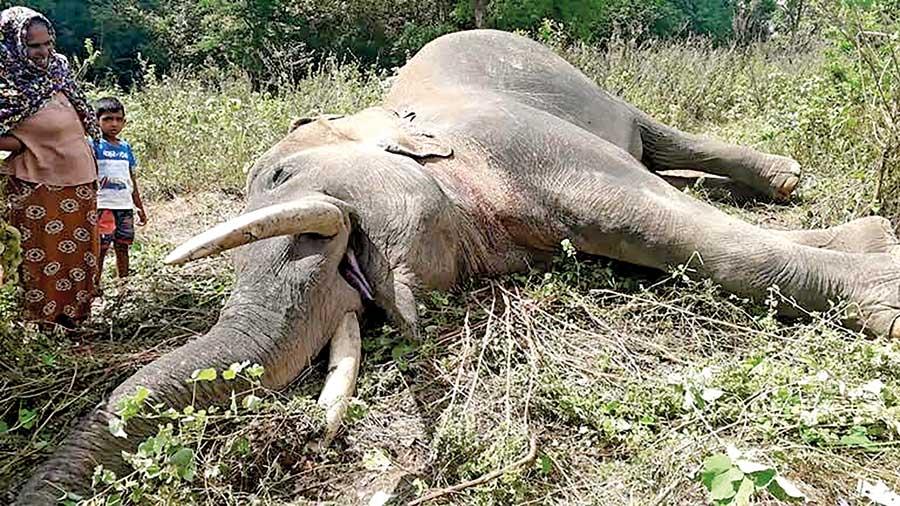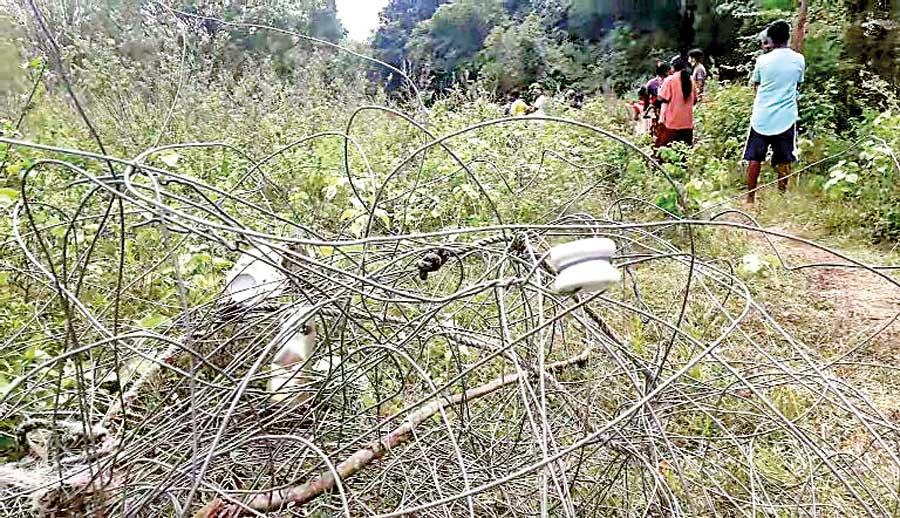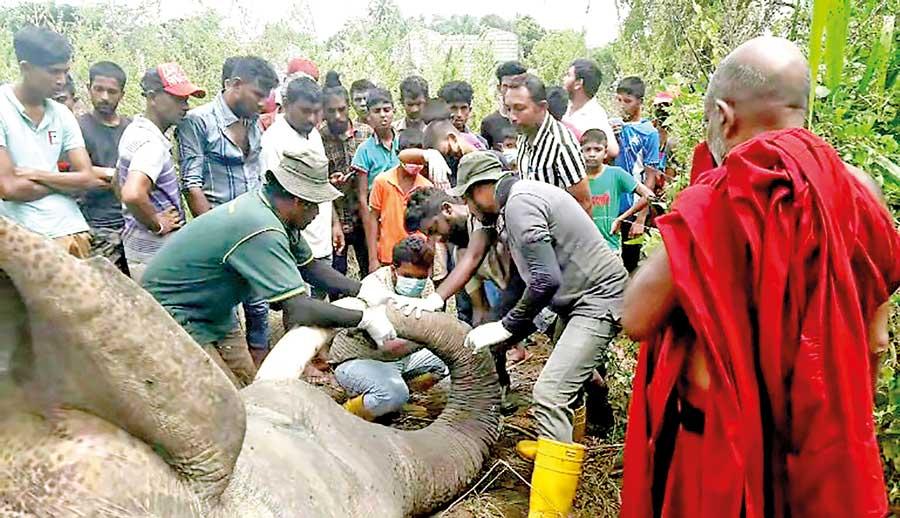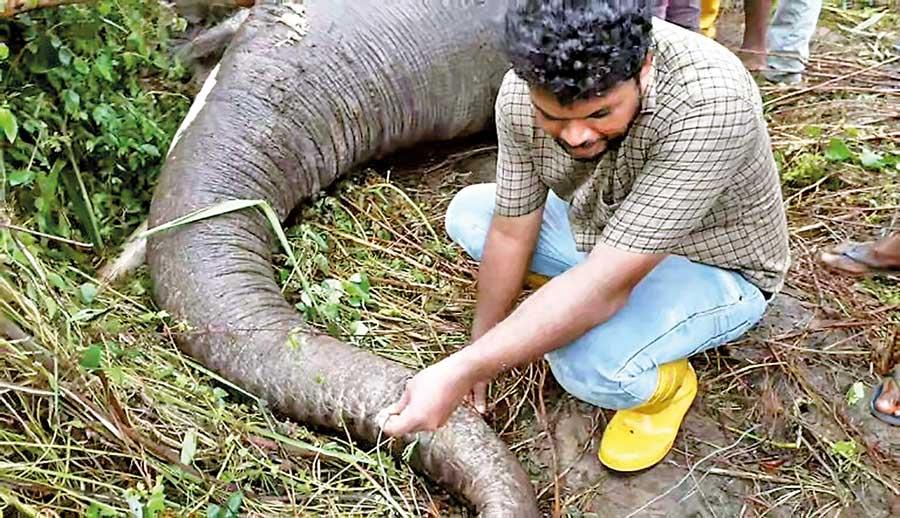Reply To:
Name - Reply Comment
Last Updated : 2024-05-08 00:01:00

Barana electrocuted to death - statistics reveal a spike in number of elephant deaths due to electrocution
- Both these jumbos were victims of illegal electrocution
- Anthropogenic factors continue to pose irreversible threats on wildlife and conservation practices
- Wildlife officials are conducting further investigations and have requested the public to assist them
- Elephants understand ecological boundaries rather than man-made boundaries
- The FFPO has adequate provision to charge a person who kills an elephant
Conservationists and elephant lovers shed tears when the mysterious death of Barana, an iconic tusker that frequented the Kala Wewa-Namal Uyana sanctuary made news last week. On the same day the corpse of another was discovered. Both these jumbos were victims of illegal electrocution. Statistics show a spike in the number of elephant deaths due to electrocution and conservationists predict the situation to worsen due to the prevailing economic crisis. Anthropogenic factors continue to pose irreversible threats on wildlife and conservation practices and wildlife experts continue to urge authorities to implement appropriate policy decisions more effectively to minimise further threats on Sri Lanka’s flora and fauna.
frequented the Kala Wewa-Namal Uyana sanctuary made news last week. On the same day the corpse of another was discovered. Both these jumbos were victims of illegal electrocution. Statistics show a spike in the number of elephant deaths due to electrocution and conservationists predict the situation to worsen due to the prevailing economic crisis. Anthropogenic factors continue to pose irreversible threats on wildlife and conservation practices and wildlife experts continue to urge authorities to implement appropriate policy decisions more effectively to minimise further threats on Sri Lanka’s flora and fauna.
Three persons arrested
Wildlife officials at the Nikaweratiya Wildlife veterinary unit had conducted the post-mortem on the murdered iconic tusker. Concluding the investigation Dr. Isuru Hewakottage said that the cause of death was due to the excess pressure on the heart of the elephant due to electrocution. Barana was found dead in an open patch of land in the Namal Uyana forest reserve. The reserve lies adjacent to a private land. Veterinary officers also discovered an illegal electric post in a nearby private land where the tusker was found dead. Several electric wires had also been found at an agro well in close proximity to this private land. Even though the officials suspect that someone would have obtained electricity this way, no arrests have been made so far. Following the post-mortem the tusks were taken into the custody of the Galkiriyagama wildlife office and the corpse was buried thereafter. While performing final rites, residents have also witnessed how another elephant had attempted to join them in bidding adieu to Barana. The Galkiriyagama wildlife officials have arrested three persons in relation to Barana’s death and have been produced to the Kekirawa District Court. Individuals arrested include the owner of a house that had illegally obtained electricity, another individual who had been removing electric wires that had provided electricity to the fence that electrocuted Barana and the owner of the private land on which the electric fence was put up. The main suspect of the incident had fled and is alleged to be working at the Police.

Electric wires found from a nearby agro well
I have photographed him from various angles, but he was a cool character. Why I love him so much is that he would never interfere with us. But the second generation elephants are a bit more aggressive. One of the reasons why elephants are facing this plight is because we have lost our moral values
- Mevan Piyasena Veteran Wildlife Photographer
Sri Lanka loses a super tusker
“Barana was one of the most frequently photographed tuskers around the Kala Wewa Namal Uyana sanctuary. I had photographed Barana since 2016 and according to our records it came into effect in September,” opined veteran wildlife photographer Mevan Piyasena. He is the last tusker to reach Kala Wewa to find a partner for mating. Barana was around 40-45 years of age and we called him a super tusker because it had the biggest tusks among the elephant herds in Kala Wewa. But we are constantly losing super tuskers due to man-made reasons. Last year we lost Revatha and now, Barana.
‘‘On the other hand, since 2019, the water levels at the Kala Wewa had risen due to the construction of the Ibbankatuwa tank. Around 100-200 elephants used to gather at the Kala Wewa but now the numbers have dropped. When water levels rise in Kala Wewa it affects inter-migration of elephants and this aggravates the human-elephant conflict. Such is the plight of elephants in the North Central Province,” he added.
‘‘Another concern is the risk posed on the future generations of super tuskers. It would take long years for the next generation of super tuskers to develop features similar to that of Barana’s generation. But research has shown that elephant calves are at risk of dying after two years since they have lost their migratory paths and there is no food diversity in the habitats that they live,” Piyasena continued.
He further said that Barana was never a man killer. “I have photographed him from various angles, but he was a cool character. Why I love him so much is that he would never interfere with us. But the second generation elephants are a bit more aggressive. One of the reasons why elephants are facing this plight is because we have lost our moral values. Back in the day people coexisted with elephants and there was a larger number of elephants in the jungles compared to today. Farmers used to leave the remaining harvest (Ipanella) for elephants, but now they don’t leave it as they go into the next round of cultivating. Therefore values are essential in order to ensure that elephants are conserved in future,” Piyasena underscored.
In most instances people obtain electricity for a fence to protect their vegetable plots from wild animals including elephants. So the best thing would be to continue raising awareness among these communities
- DWC Director General M. G. C Sooriyabandara.
Punishments implemented according to Penal Code : DWC
Perpetrators of wildlife crimes are seldom identified or apprehended as they have alleged links to politicians and those in power. While wildlife officials are continuing investigations the DWC says that they need to handle these incidents case-by-case. Perpetrators are apprehended as per the Penal Code and we have already spoken to relevant authorities on the issue of illegal electric fences and posts, opined DWC Director General M. G. C Sooriyabandara.
When asked if the Flora and Fauna Protection Ordinance would be amended to increase fines and penalties on those who illegally obtain electricity, Sooriyabandara responded in the negative while explaining that this task doesn’t come under his purview. “In most instances people obtain electricity for a fence to protect their vegetable plots from wild animals including elephants. So the best thing would be to continue raising awareness among these communities. We can also conduct inspections on whether there are illegal electric fences /posts along elephant corridors. So we will have to identify these areas separately and conduct investigations thereafter,” said Sooriyabandara .
(Pics and additional reporting by Kushan Jayawardana - Galkiriyagama)
 Wildlife officials conducting post-mortem on Barana
Wildlife officials conducting post-mortem on Barana
Increasing number of elephant deaths due to electrocution

If we want electric fences to be effective, it should be erected on the ecological boundary, regardless to the ownership of the lands because the electric fence is NOT for boundary demarcation, but it is to keep elephants out of developed areas
- Dr. Sumith Pilapitiya, Leading elephant researcher
Statistics reveal an increase in the number of elephants dying due to electrocution. However, conservationists opine that existing electric fences should be relocated to ecological boundaries if they are to be effective. This is because elephants understand ecological boundaries rather than man-made boundaries. In an interview with the Daily Mirror, a leading elephant researcher and former Department of Wildlife Conservation (DWC) Director General Dr. Sumith Pilapitiya said that in the long-term, the DWC and the Ceylon Electricity Board (CEB) will have to work together to amend existing regulations and ensure that the risk to elephants dying of electrocution is minimised.
Excerpts of the interview:
 Q Barana isn’t the first elephant to die of illegal electrocution. Do you have a record of the no. of elephants that have died of illegal electrocution?
Q Barana isn’t the first elephant to die of illegal electrocution. Do you have a record of the no. of elephants that have died of illegal electrocution?
As the data in the above table reveals, there is an increase in the number of elephants dying of electrocution. The reduction in 2020 is most likely due to the Covid restrictions that impacted adversely on agriculture.
Q Can elephants be electrocuted by the electric fences erected by DWC?
An electric fence designed to deter elephants from crossing it, is powered by an energizer which is electrified by a 12 volt battery or main current. The energizer converts the electricity to a high voltage, low amperage DC pulse at about 1 pulse per second and a pulse duration of a few thousands of a second. Fences used to deter elephants usually have a voltage between 6,000 to 9,000 volts and a current of about 5 milliamperes. Touching such a fence gives a powerful electric shock, but there is no physical harm to a person or animal from the current.
But elephants get electrocuted when some people- farmers in particular- connect their household electrical supply directly to fence, and contact with it most likely results in death. Connecting a household supply directly to a fence is illegal under the CEB Act.
Q You have repeatedly said that electric fences a viable solution to mitigate the HEC. What are the laws in place to apprehend perpetrators who use electricity in an illegal manner with the intention of electrocuting elephants?
Electric fences are the most viable mitigation measure for HEC, IF THE ELECTRIC FENCES ARE LOCATED ON A BOUNDARY THAT ELEPHANTS RELATE TO. Ever since Sri Lanka has been using electric fences as a barrier, we have been erecting fences largely on the administrative boundary between Department of Wildlife Conservation (DWC) and Forest Department (FD) protected areas and on other administrative boundaries that humans have demarcated. However, elephants don’t relate to man-made boundaries. Elephants understand ecological boundaries, which are the boundaries between habitat used by elephants and developed areas. If we want electric fences to be effective, it should be erected on the ecological boundary, regardless to the ownership of the lands because the electric fence is NOT for boundary demarcation, but it is to keep elephants out of developed areas. So if electric fences are to be effective, all existing fences have to be relocated to ecological boundaries.
But this has not happened even though the National Action Plan for HEC Mitigation- prepared by a Presidential Committee appointed by President Gotabaya Rajapaksa-recommended it. Unfortunately, this plan is lying on a shelf in the Presidential Secretariat since December 2020 without being implemented. To reiterate, electric fences are the best barrier for HEC mitigation as long as it is erected on boundaries that elephants relate to.
The FFPO has adequate provision to charge a person who kills an elephant. DWC has been charging people who have been involved in this illegal activity. As stated earlier, connecting a household supply directly to a fence without going through an energizer is illegal even under the CEB Act. So there is adequate legal provision to charge perpetrators. But it appears that the penalty is inadequate to deter people from doing so.
Q Have there been proposals to prevent illegal electrocution of elephants?
The DWC has been trying to increase the penalties for people who kill elephants. This includes penalties for people who connect household electricity directly to the fence. I think that the penalty is inadequate to deter people from doing so, so the penalties should be significantly increased.
Q Barana was an iconic tusker that had been frequently photographed. What policies and interventions are required at this point to minimise risk of elephants dying due to illegal electrocution?
Sri Lanka has a very low percentage of tuskers, compared to many Asian elephant range countries. We have around 5-6% of the males having tusks, whereas it is around 90% in South India. Therefore, it is essential that we, as a nation, do all we can to protect our tuskers. As the data above reveals, the trend of electrocution of elephants is on the increase. That is an obvious indicator that the deterrents are inadequate.
In addition to significantly increasing the penalties for illegally connecting household electricity to their fences, there are other measures that can be taken. I feel that DWC should work with CEB and reach an agreement that if any person illegally connects their household electricity supply to a fence and kills an elephant, the CEB will disconnect their household electricity supply for 10 years. Regulations may have to be amended to enable this, but I think this will be a much more effective deterrent than what is available at present.
Ideally checks should be done in areas with grid connected electricity where there are agricultural lands adjacent to households with grid electricity to see if there are power lines connected directly to their fences. Through such checks we can prevent possible electrocutions, which is better than penalizing people after the elephant is dead. Obviously DWC does not have the manpower to deploy staff to check on such fences. But DWC could work with CEB to get the metre reader to check when he goes to read the metre. This additional task should not take more than an additional 5 minutes and this is not needed everywhere. After all, according to COPE, the metre readers are getting paid an incentive for reading the meter accurately, so asking them to actually do some work for the incentive payment could be beneficial to both CEB/DWC and elephants!

Man Monday, 01 August 2022 01:13 PM
So, no accuse / culprit who drew the power line?
Allan Poing Tuesday, 02 August 2022 04:10 PM
We have come at a stage where we see that National Parks are simply not working. We have to hem in the population of humans in favour of wildlife, not the other way around.
“ The Lansi Burgher Gent “ Friday, 05 August 2022 02:57 PM
What a sad state of affairs, here. Being a predominantly Buddhist Country, this should never happen. These humble, majestic animals should be protected, not murdered like this. Shameful. Where are all the Maha Nayakas, the Sangha and whoever else; have you? The laws on animal rights, the punishments for the mistreatment and abuse of animals like our dogs and elephants, must be severe. No wonder this place is cursed. I hope the big wigs, get a move on and put an end to this. Overpopulation of the human kind is killing what’s little left, of our natural resources, our environment and eventually our planet.

Add comment
Comments will be edited (grammar, spelling and slang) and authorized at the discretion of Daily Mirror online. The website also has the right not to publish selected comments.
Reply To:
Name - Reply Comment
US authorities are currently reviewing the manifest of every cargo aboard MV
On March 26, a couple arriving from Thailand was arrested with 88 live animal
According to villagers from Naula-Moragolla out of 105 families 80 can afford
Is the situation in Sri Lanka so grim that locals harbour hope that they coul
07 May 2024 - 2 - 1392
06 May 2024 - 3 - 1225